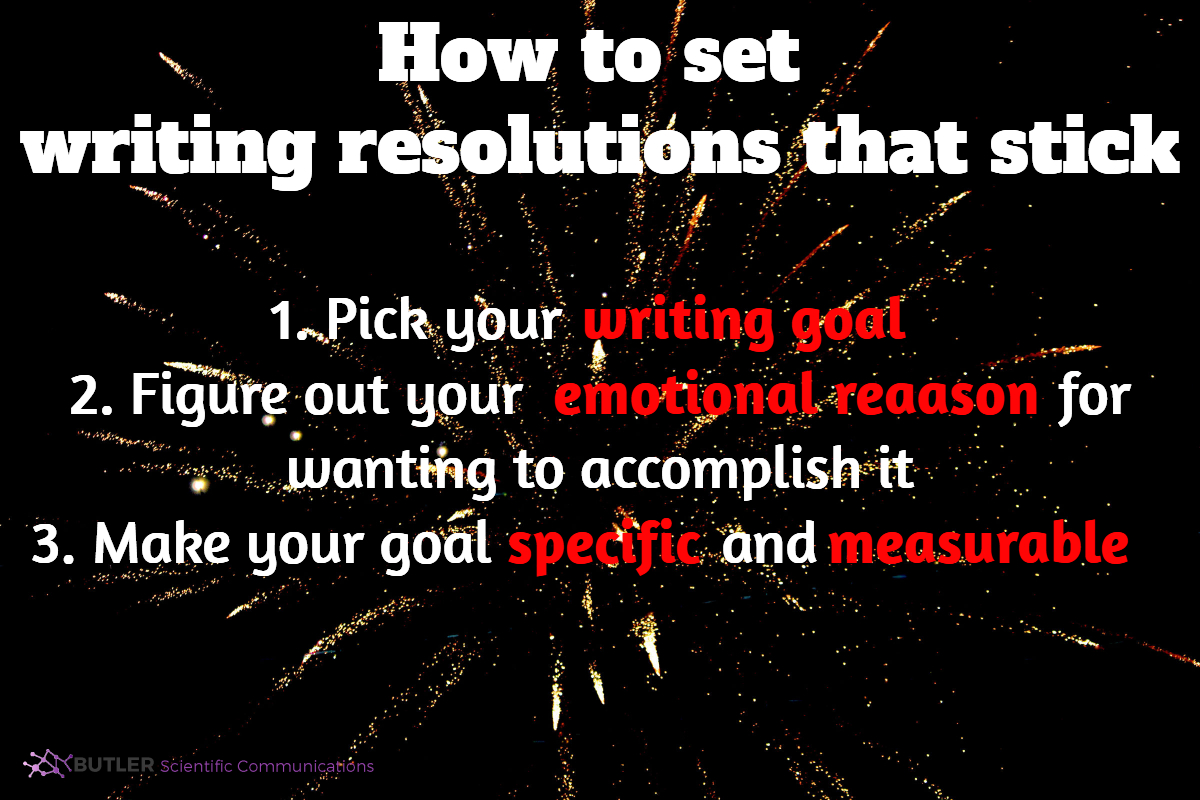Writing is a touchy subject in academia.
Basically, everyone should be writing, and no one is writing nearly enough.
Ask anyone, from a graduate student to a full professor, how their writing is going, and you are likely going to see that deer-in-the-headlights panic.
Its also about that time again…the end of the year when one looks back on what they wish they wrote over the past 12 months and the beginning of a new year when hope for making good on those visions of published papers and funded grants can overwhelm us into making ridiculous resolutions that we never stick to, sending us into a further spiral of guilt and panic.
While the desire to improve ones output and make resolutions isn’t intrinsically ridiculous, the way people often go about setting resolutions, unfortunately, can lead directly to failure, which makes their resolution seem ridiculous in retrospect.
Therefore, let’s take this bit of time at the start of the new year to figure out how we want to improve our writing for this year and how we can set ourselves up for success.
Lets maybe start with a goal to have a writing habit and writing skills that WON’T send us into a panic when asked…
So, how do we get there?
First, analyze your writing habits
What do you want to change or improve?
Maybe a resolution for where you want to be this time next year immediately pops in to your head. You know exactly where you need to be, so your resolution is clear.
But also, maybe it isn’t, and that’s also okay. That doesn’t mean you can’t set yourself a goal.
To determine some directions you can take, look at the gap between your expectations you had at this time last year and where you are now. Do you see any resolutions popping out?
- Did you expect to publish your first paper, but it still isn’t out?
- Did you want to publish 6 papers in your group, but only got out 3?
- Do you have good results that you can’t seem to get past an editor?
- Is there one line on your to-do list that has been there, untouched, for months?
If there is nothing so concrete there for you, what about something more fundamental that might be holding you back from achieving your full potential?
- Do you find that you never have time to write?
- Are you struggling to maintain your energy levels?
- Do you feel overwhelmed with a task you need to accomplish so never know where to start?
Any of these situations can give you an idea of something you can strive to work towards next year that can help you improve your scientific communications.
What is my personal goal for this year?
I tend to work in manic spurts, riding a wave of motivation to 10-12 hours of concentrated writing work for several days that ends up leaving me burned out for over a week, unable to concentrate on anything.
I would prefer, instead, to work in a steadier fashion, forcing myself to take reasonable breaks and quit work for the day while I am still ahead so I can work steadily over time instead of in fits and starts.
So, how am I going to stick to my goal?
Plan your goal to make it stick
Why do you want this goal? Be EMOTIONAL!
The first, and arguably most important, aspect of making your resolutions stick is tying it to your emotions by establishing your deep-down why – why do you REALLY want this goal?
It sounds simple, but this is a more difficult task then it sounds due to our ability to lie to ourselves and attribute much more socially approved motivations to our aspirations than are actually true.
Its easy to look at someone who makes a resolution to start going to the gym at the beginning of the year. If asked for their motivations, I’m sure there are a lot of reasons they would list…
- I want to be healthier.
- I want to improve my cholesterol levels.
- I want to lower my stress levels
This is the list of public reasons. That is because these reasons all sound good and proper, and anyone that you tell these reasons to is certainly going to nod in agreement.
These reasons are all true…someone who resolves to start going to the gym really does want to be healthier and have reduced cholesterol levels.
Unfortunately, though, none of those reasons are going to get someone into their workout clothes when they are tired after a long day and just want to sit down. They won’t get someone out of bed early for a workout when they’d rather keep sleeping.
They don’t work because they aren’t their emotional reasons.
While public reasons might be good, to stick to a resolution, it is important to dig deep and find the real reason why you want your new goal. Now, this reason is often difficult to find because it sounds “selfish” or “narcissistic” or “politically incorrect”, and its likely you might feel uncomfortable telling someone this reason if they ask you why you picked your goal, and that is perfectly okay.
Your emotional reason isn’t for anyone else’s ears but yours, but it is vital that you find it if you want to ensure that you stick to your goals.
In terms of going to the gym, what might emotional reasons be?
- To wear THAT outfit.
- To look “hot” on the beach.
- To have a booty that turns heads.
How are these reasons different from the first ones? In general, these reasons have much more emotion tied to them than the first list of reasons, and emotions are motivating.
It is easy to picture in your head day after day how you will feel if you catch someone turning to look at your body that you worked hard to sculpt. Its easy to picture how you’ll feel if you look perfect in an outfit you’ve been drooling over for months, and, more importantly, its easy to latch on to that emotion day after day when you’ve lost the motivation to go to the gym.
More importantly, it is easy to fear the picture of yourself if you don’t fit in that outfit or feel fat on the beach or don’t get your “booty”, and that fear is tied to deep emotions…and is very, very motivating.

Unfortunately, as scientists we also like to think that we are subjects of reason and that emotions don’t play a role in the decisions we make. Of course we don’t need the emotional reasons to stick to our goals, right?
Wrong.
When has deciding to write 6 papers in a year ever gotten 6 papers in a year written, except for pre-tenured professors? After tenure, life and research and students always get in the way, and its easy to justify why one less or two less papers per year are still acceptable outputs.
So why might pre-tenured professors be different? What changes after tenure that makes it easier for writing goals to slip by the wayside?
Maybe it is that these professors are new and “fresh” and are enthusiastic about a new lab and new ideas. This enthusiasm and excitement is hugely motivating and is more than enough to get people out of bed in the morning.
Maybe it is also that pre-tenured professors are afraid for their tenure package and, ultimately, of not getting tenure. Why? Professors are afraid of not finding other employment, afraid of facing their peers, afraid of the failure of it.
And, once again, fear is hugely motivating.
Looking back on my own experiences, what was it that finally made me strive to improve my own communication skills?
I had public reasons for this:
- Academics should know how to write papers.
- Academics need to get papers published.
- You had to be good at writing to get grants and funding.
Were any of these reasons mine? Yes, in a way….in the way that none of them were false.
But what actually motivated me to start improving my communication skills?
What were my emotional reasons?
- I didn’t want to look stupid in front of my professor.
- I didn’t want to look stupid in front of future bosses who might read my papers.
- I didn’t want reviewers to find a mistake that my boss would then judge me for.
Ultimately, that first reason was my major motivation – I wanted to be good at writing papers because when my boss read them, I wanted him to be impressed.
I didn’t want him to think I was stupid or incompetent because of my writing style or because of a stupid mistake in a manuscript. His good opinion mattered, and I felt so incompetent when faced with a blank document that I vowed to learn how to properly compose a manuscript.
Ultimately, wanting to improve my writing because I wanted to be a good academic is noble, but it would never have kept me motivated to keep learning when I was tired and stressed and when it would have been easier to just give a terrible draft to my boss.
My fear motivated me and kept me going.
When I was emotionally invested in the outcome, it was impossible to not be motivated.
What is your emotional reason?
Find it, grasp it, keep it to yourself if you need to, but keep it.
Take that reason and picture it, vividly, in your mind. How will you feel when you accomplish that goal? How great will it be? Feel it and embrace that.
In contrast, how will it feel if you lose motivation and don’t achieve your goal? Feel that, too, so you know what you are trying to avoid.
Take this emotional reason and keep it in mind constantly. Only when it starts to fade will your motivation start to fade….if you can keep stoking that emotional fire, you will have motivation to spare.
Make your goal measurable
There is one more thing that the emotional lists have in common over the public lists….they are generally specific enough that a solid picture of it can be created in the mind of the goal-setter.
Look at the non-specific ones…to be healthy? What is healthy? What does it look like? What does it feel like? What about to be a good academic? What does that look or feel like?
You can’t picture it?
Neither can the person who made those resolutions without attaching them to something emotional.
It is hard to get so emotionally worked up about a non-specific situation, so emotional goals are generally very specific.
- To fit into THAT dress.
- To get tenure.
- To impress my boss with a draft.
So the second task for making your goal stick? Make it specific…as specific as you can. And measurable…make sure you will know for sure when you accomplish it.
Then take that goal and picture it and feel it. Imagine everything you are going to feel when that goal is accomplished and hold those feelings.
How to make a resolution you can stick to
So, to sum up, spend a day this week at the start of the new year thinking about what you want to accomplish in your writing life, and follow these three steps to set a resolution that will stick:
- Set your goal
- Figure out the emotional reasons you want this goal
- Make your goal specific and measurable
If you want to set a specific writing goal this year but think you’ll need help accomplishing it, leave us a comment, and we’ll be sure to get some new posts that will help you along the way!

